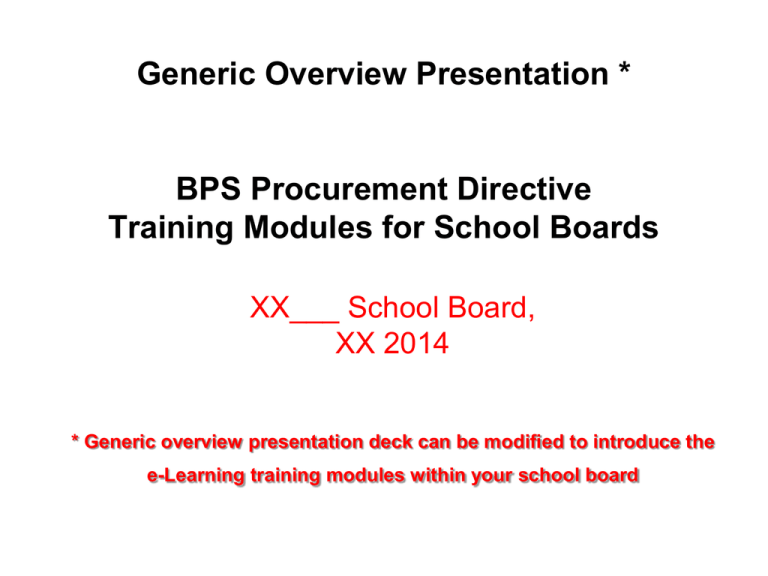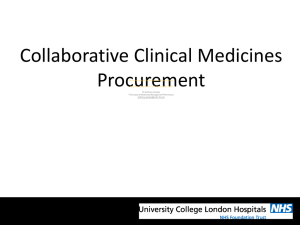Generic Overview Presentation
advertisement

Generic Overview Presentation * BPS Procurement Directive Training Modules for School Boards XX___ School Board, XX 2014 * Generic overview presentation deck can be modified to introduce the e-Learning training modules within your school board Why does Procurement Training Matter? • Responsible Management of Public Funds – Across the XX School Board, staff and stakeholders are involved in various types of procurement activities. These individuals are entrusted to manage school funds responsibly and effectively. – Effective and responsible purchasing/procurement practices support value for money, promote open, fair and transparent processes for suppliers and protect the school board from risks and liabilities. • It’s the law - All school boards are required to be fully compliant with the Broader Public Sector (BPS) Accountability Act, 2010 including the BPS Procurement Directive. • The Auditor General of Ontario assumes school board compliance with the BPS Procurement Directive. • XX School Board is required to attest to compliance requirements. 2 Roles & Responsibilities – Who is accountable? • Whether you are a Trustee, Director of Education, Superintendent, Supervisory Officer, Principal, Vice Principal, Secretary/Clerk, Teacher, Operational or Business Staff, Parent or Student Council member or other board staff, you need to understand your role and responsibilities in procurement activities and/or decisions based on the BPS Procurement Directive. 3 The BPS Procurement Directive • The BPS Procurement Directive issued by the Province of Ontario: – provides consistent procurement practices for BPS organizations; – helps to ensure that publicly funded goods and services are acquired by BPS organizations through a process that is open, fair and transparent; – promotes accountability through each stage of the procurement process; and – maximizes the value that school boards receive from the use of public funds. • XX School Board must meet the following Requirements: – Develop a Supply Chain Code of Ethics – Ensure that Procurement Policies and Procedures are in place – Adhere to the 25 Mandatory Requirements of the Directive 4 Current Status: Procurement Practices in XX Board • Currently XX School Board is in compliance with XX of the 25 mandatory requirements of the BPS Directive. Board staff have identified gaps in XXX and XXX. Through training and updates to procedures, the board is targeting full compliance by XXX. Key BPS Directive Requirement/Category Current Status: BPS Requirement Vs. Implementation Board Policy Timeline/Considerations Adoption of Supply Chain Code of Ethics Segregation of Duties and Approval Authority Levels Competitive Procurement Thresholds Supplier Prequalification's Competitive Procurement Processes (Timing, Posting, Evaluation etc.) Non-Competitive Procurement Processes (Use of Single or Sole Sourcing) Contract Award Contract Management Conflict of Interest 5 Supports for Compliance • To reach full compliance, school board officials from across Ontario identified the following key supports: – An increased awareness of the Accountability Act and the BPS Procurement Directive across school boards; and – Consistent training across all boards to help staff and stakeholders understand their roles and associated responsibilities relating to the procurement activities. • As of April 2010, all school boards were required to be in compliance with the BPS Procurement Directive and have procurement policies publicly available. - XX Board – Insert Board Status • The training we are launching today will promote effective, responsible and value for money procurement and support compliance with the Directive across our school board. 6 New Procurement Training Modules • In 2012, the BPS Procurement Directive Working Committee was established, chaired by the Ministry of Education with representation from school boards including Directors, Senior Business Officials, procurement, finance, operations, transportation, construction and maintenance, information technology, human resources and internal audit staff. • With support from the Ontario Association of School Business Officials (OASBO), the Committee collaborated and developed procurement training modules to help school boards: – Understand their collective roles and responsibilities in procurement activities and/or decisions; – Maximize the value that school boards receive from the use of public funds; – Help manage procurement risks; and – Comply with the BPS Procurement Directive. 7 New Procurement Training Modules Cont. • The training modules we are introducing today should help you answer the following key questions: – Why is the BPS Procurement Directive important? Why do schools boards have to follow it? – Who is responsible for procurement decisions? (Segregation of Duties and Approval Authority Schedule (AAS)? What is my role? – What are the Procurement Thresholds for Goods and Services? – What is the difference between a competitive procurement and a noncompetitive procurement? When can each method be used? – Etc. Insert any additional info here 8 Key Features of the Training Modules The training package includes 6 modules which cover the BPS Procurement Directive and its 25 mandatory requirements: 1. 2. 3. 4. 5. 6. BPS Accountability Act Competitive Procurement Procurement Evaluation Procurement Award Post Award and Contract Management Non-Competitive Procurement The content is user-friendly, bilingual, AODA compliant and the content is customized to 4 different user groups: 1. 2. 3. 4. Governance and Senior Leadership Staff Operations Staff School Administration Staff Teachers, Parents and Student Councils 9 Key Features of the Training Modules • The modules also include: – Illustrative case studies with questions and answers to affirm learning principles – 8 procurement checklists – a glossary of common terms and definition (See Appendix A for screen shots). 10 Next Steps Training Implementation Options Key decisions to support implementation in our board: – Who receives training and how is it provided; – How is completion tracked; and – Roles for Procurement, Human Resources, IT to support the roll out. Possible Options for school board implementation: 1. Build modules into the board’s Learning Management System (LMS) (if available) • If incorporated into LMS, then the board may be able to automatically track completion for possible attestation purposes 2. Incorporate modules into the board’s Intranet where all staff can have access: • School level stakeholders such as student and parent council groups and school staff with limited board access may need to be accommodated • Manual tracking of stakeholder and staff completion may be required 3. Integrate training as part of staff learning plans/mandatory training i.e. refresher training every 1 or 2 years and include training as part of new employee orientation 11 Appendix A: Features of Modules - 4 Streams / User Groups Appendix A: Features of Modules - AODA Compliant AODA Compliant including Closed Captioning and accessible formats Appendix A: Key Features of Modules - Bilingual Appendix A: Key Features of Modules - Glossary Appendix A: Key Features of Modules - Case Studies Practical school board case studies with Knowledge Checks to affirm learning Appendix A: Key Features of Modules - Procurement Checklists 8 detailed procurement checklists included as part of the Checklist Toolkit








